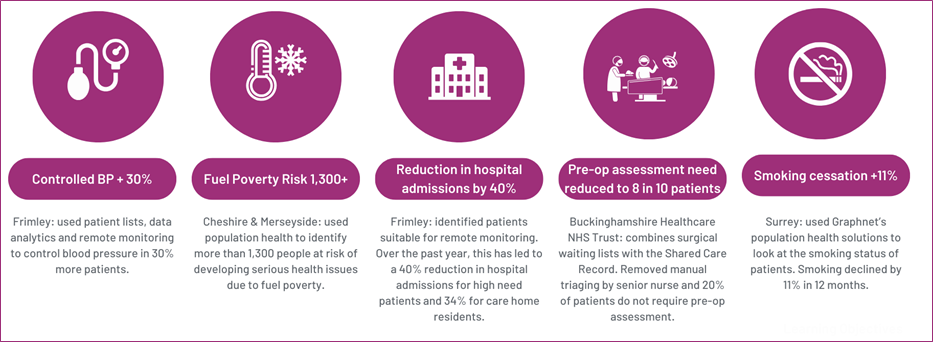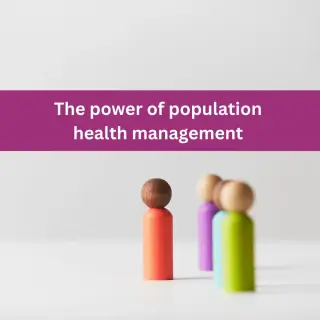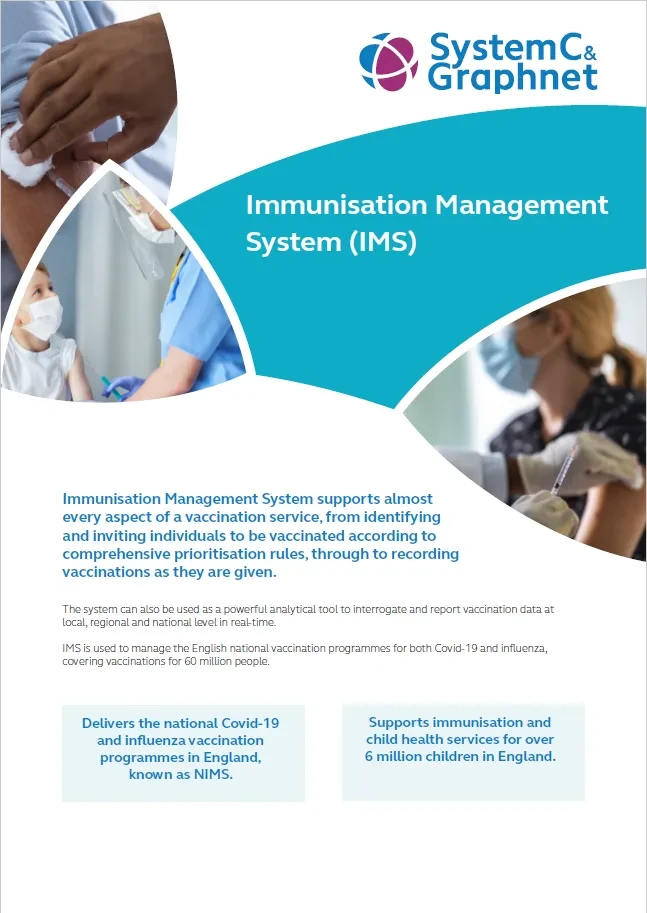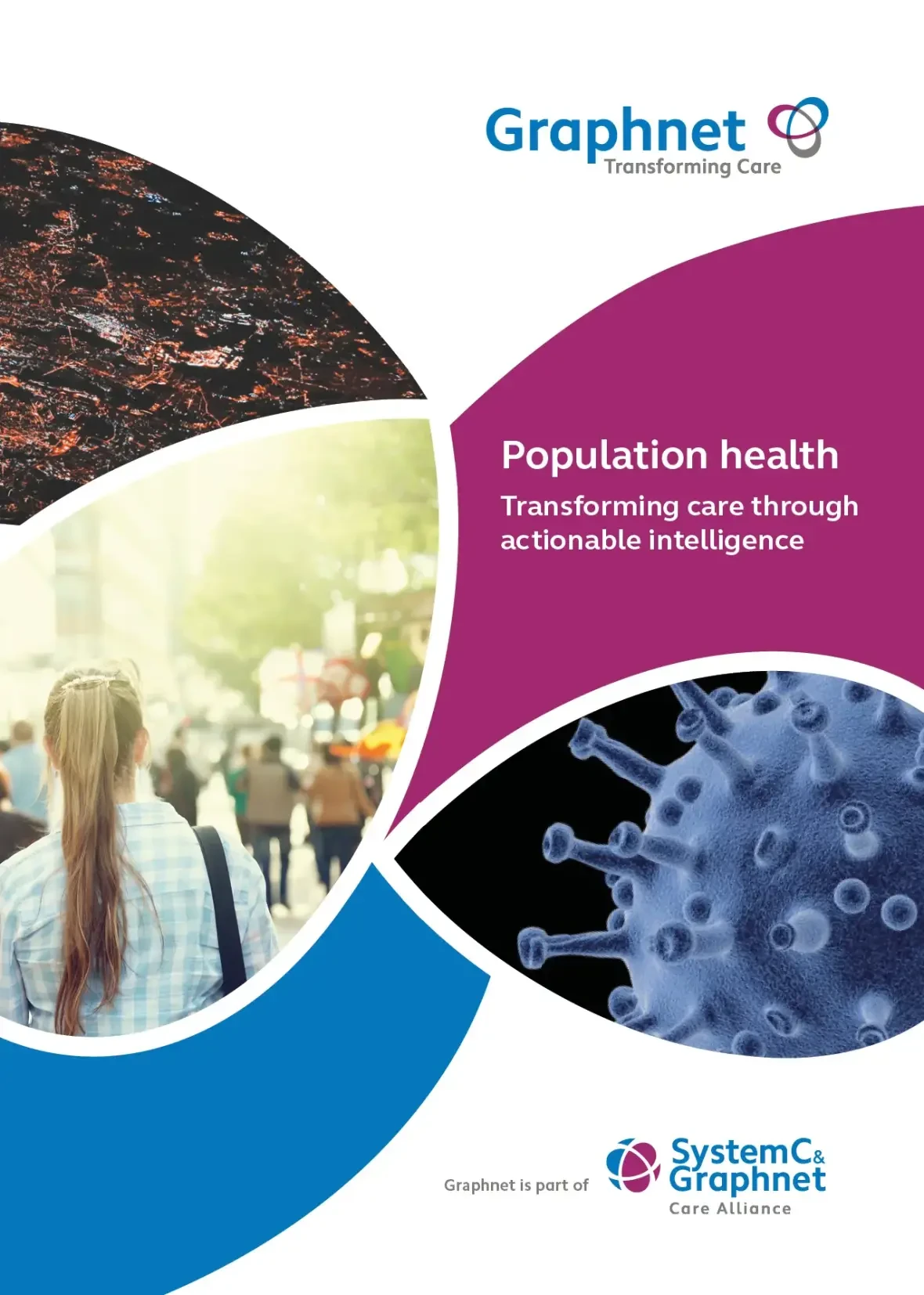Population Health Management Software
Population Health Insights To Actions (PHITA) provides a unique end-to-end population health system that supports preventative and proactive care. It has been proven to support the NHS, local authorities, and social care and to produce better patient outcomes, increase efficiency, streamline healthcare delivery, reduce costs and deliver transformation of healthcare delivery.
This is the only UK solution that can support health and care systems throughout their entire population health management journey, enabling early intervention, prevention, and proactive care. The rich insights gained from PHITA allow health and care providers to identify the patients most in need, make proactive plans and decisions with tangible, trackable results, and keep people out of hospital by caring for them in the comfort of their own homes.

Population Health Use Cases
There are many examples where population health is used to transform health services, here is a snapshot of just some.

The need for data-rich population health management systems has never been more important. Our solutions provide ICSs with a configurable analytics platform that enables clinicians to securely communicate, collaborate and improve patient care in the UK
Contact Us About Our Population Health Management Tools
System Features
We offer a true population health management solution – from enabling cohort identification for existing and new pathways and programmes, through to enrolling, monitoring, and managing these same individuals for proactive and preventative care.
The data intelligence generated by Graphnet’s population health platform produces rich insights at a population, location, cohort and individual level that can be used to drive actions such as predicting when and where a surge in demand will likely come from and putting appropriate solutions in place.
It empowers Integrated Care Systems to develop their own analytical eco-systems by providing a configurable platform that:
- Seamlessly links an enhanced range of data feeds into a unified shared record.
- Supports care planning across multi-disciplinary teams.
- Enables personalised care.
- Provides personal health records and remote monitoring tools to support patient engagement and virtual care.
- Enables the evaluation of intervention impacts.
- Delivers comprehensive reporting and analysis capabilities.
About Graphnet’s population health management program
The data intelligence generated by the population health platform is used to drive actions. This includes planning services such as working out what is needed, predicting when and where a surge in demand will likely come from and putting appropriate measures in place.
The platform enables evaluation and provides learning to support continuous improvement and best practices through the ability to study the impact of interventions.
It empowers Integrated Care Systems to develop their own analytical eco-systems by providing a configurable platform which enables homegrown analytics, importing local data sets and the opportunity to share and collaborate with colleagues in other areas. Using shared care and personal health record data intelligently, integrated care systems will operate more agilely, adapting and scaling up new services as demands change.
Key Benefits of our Population Health platform
In use across ICSs that cover 17 million individuals, our population health tools support ICS stakeholders at a strategic, tactical, and operational level, offering benefits such as:
- Reduced waiting lists
Reducing waiting lists is a top NHS priority. Our Elective Recovery platform helps to recognise data errors and tackle the waiting list backlog. This can include the identification of deceased patients, duplicate entries and those who are not surgically fit. The tool helps support efficiencies, maximise resources and, in the latter case, ensure patients who are not-yet-fit can be targeted for support.
- Proactive day-to-day-management and planning
The command centre dashboards aid system-level decision-making by providing an executive-level lens on local service demand and available resources – including data on emergency attendances, bed capacity, and acuity of admitted patients.
- Improved health equity analysis
Our Population Health platform enables better understanding of patient groups at risk of health inequalities. Each population health patient record is linked to an index of mass deprivation score, making it easier to identify the Core 20 population and support NHS 20+5 targets.
- Enhanced case-finding at scale
Our integrated Population Health software can case-find at scale – from ICB to practice level. Consultant lists can be stratified to rapidly identify individuals and specific groups who would benefit from early intervention and proactive care across disciplines.
Remote monitoring with Frimley Health and Care ICS
Frimley ICS’s Connected Care team has recently used population health management analytics to identify complex and frail patients who had the highest risk of experiencing unexpected illness and deterioration and prevent these patients going into crisis.
The following service outcomes have been seen in the enrolled patients between Dec ’22 and Feb ’23 against the same period in the previous year:
- 33% reduction in monthly admissions
- 55% reduction in monthly GP face-to-face consultations
- 32% reduction in monthly A&E activity
When we started the evaluation and started seeing the results for the first cohort of patients compared to others, we were astounded by the results! The beauty of having a population health platform is that you can look across the system at the impact you are having.
Anna Fishta, Programme Lead – Connected Care, Frimley ICS

Population health: data driven change
Population health is much more than an insights programme. It drives action, through the identification of problems, utilising solutions, and evaluating the impact of the interventions taken.
Being development partners with Graphnet and using their population analytics platform has really enabled us to build the supporting analytics that enable our move towards developing a mature population health intelligence system.
Mark Sellman – CIO Frimley Health and Care ICS & Connected Care















